In the fast-paced world of software development, finding the right software engineer intern who can smoothly integrate into your team is vital. To make informed hiring decisions and ensure you're bringing on board individuals with the potential to thrive, it's crucial to understand the skills required for a software engineer intern.
This blog post will provide you with a comprehensive list of essential interview questions tailored to software engineer interns at various skill levels. From basic inquiries for beginners to advanced questions for senior interns, these questions will help you evaluate candidates' competencies effectively.
By using this structured question list during interviews, you'll be well-equipped to identify top talents ready to contribute to your team. Additionally, consider leveraging the software engineering online test from Adaface to pre-screen candidates and streamline your hiring process.
Table of contents
10 basic Software Engineer Intern interview questions and answers to assess applicants
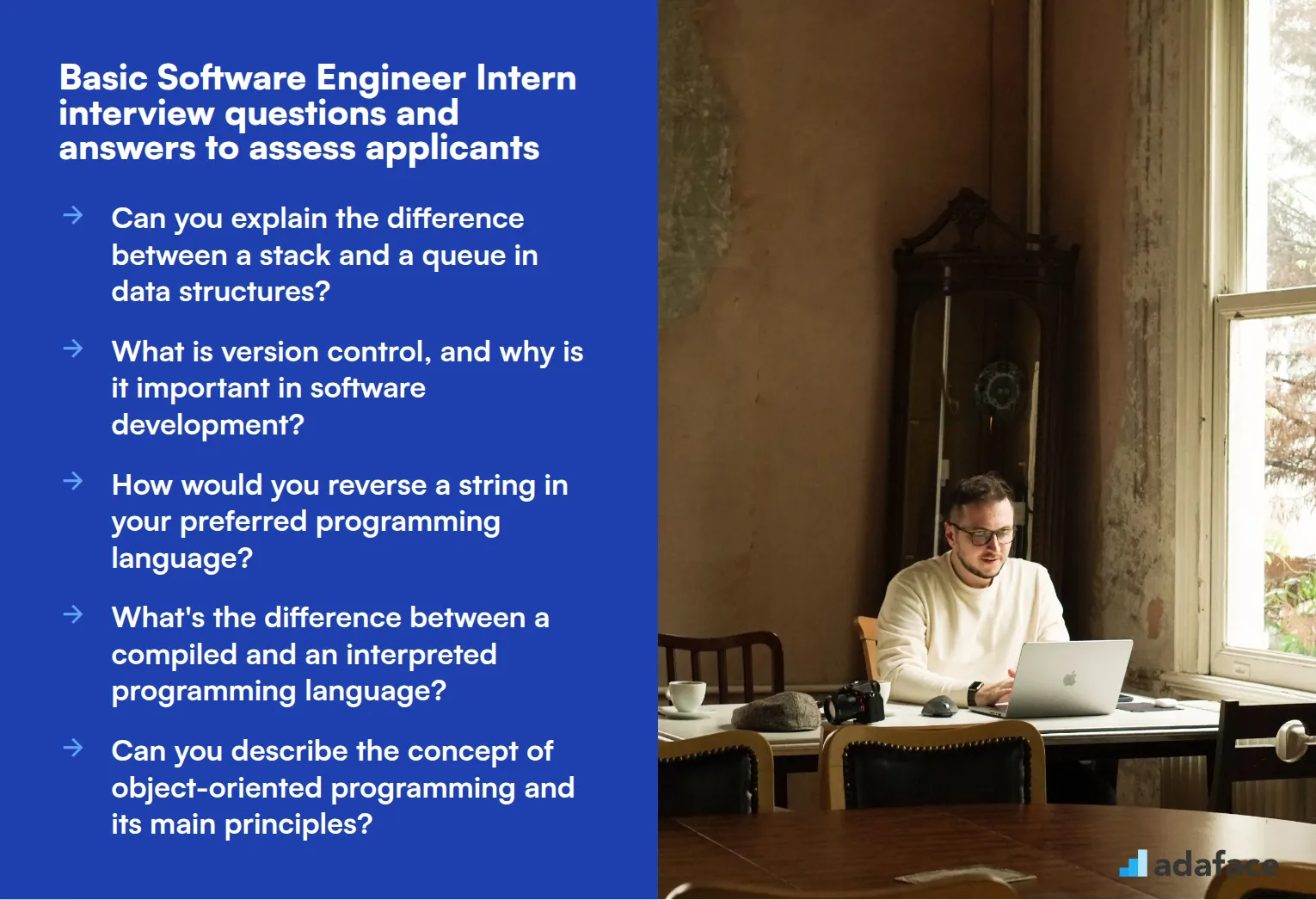
To effectively assess software engineer intern candidates, use these 10 basic interview questions. These questions help evaluate fundamental knowledge, problem-solving skills, and coding aptitude essential for the role.
- Can you explain the difference between a stack and a queue in data structures?
- What is version control, and why is it important in software development?
- How would you reverse a string in your preferred programming language?
- What's the difference between a compiled and an interpreted programming language?
- Can you describe the concept of object-oriented programming and its main principles?
- How would you handle a situation where your code isn't working as expected?
- What's your understanding of API, and why is it important in software development?
- Can you explain the difference between HTTP GET and POST methods?
- How would you approach optimizing a slow-running piece of code?
- What do you understand by the term 'responsive design' in web development?
5 Software Engineer Intern interview questions and answers to evaluate junior interns
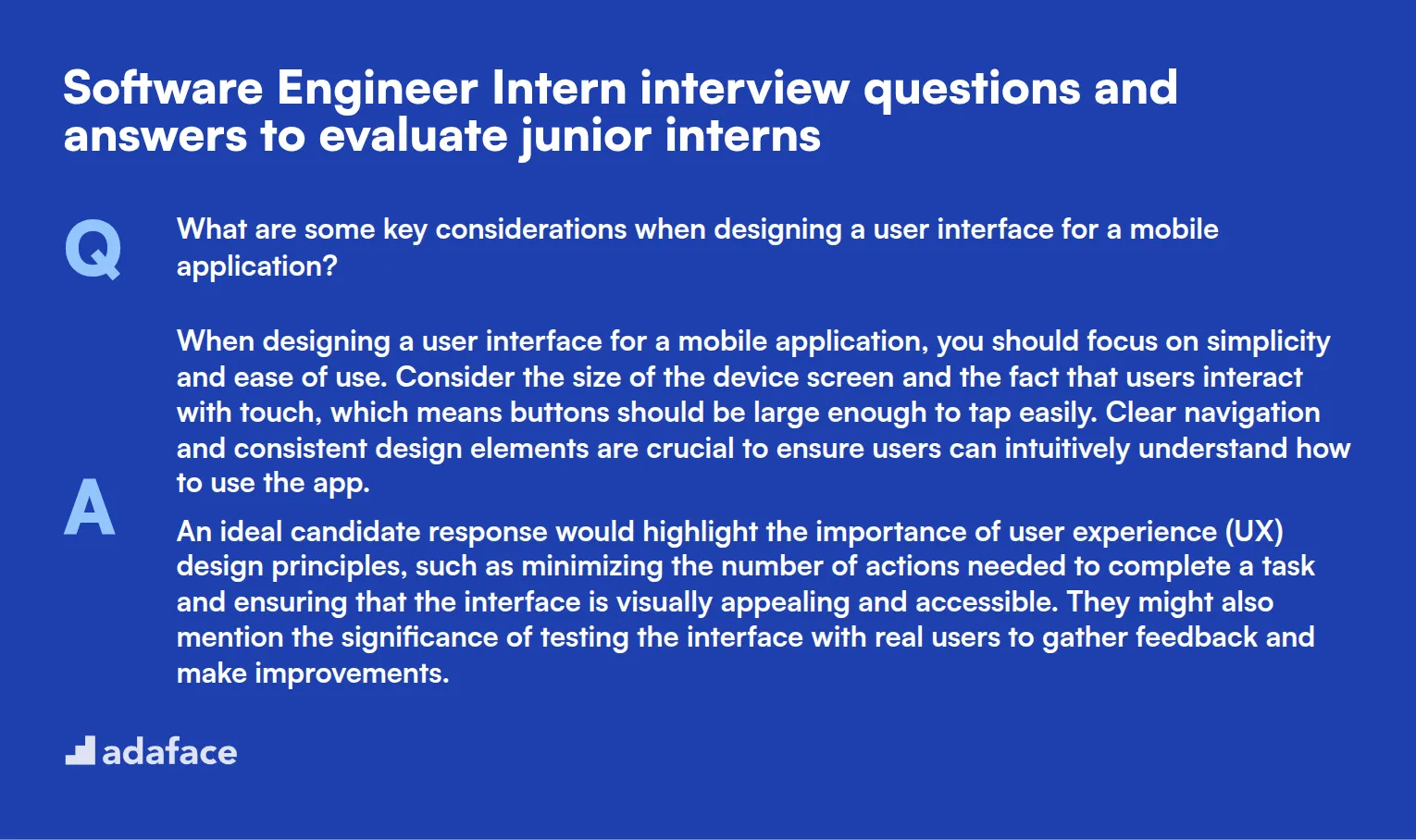
Using the right interview questions can be the secret sauce to finding the perfect software engineer intern. Whether you're screening for problem-solving skills or assessing cultural fit, these carefully crafted questions will help you dive deep into a candidate's potential and mindset. So, grab your notepad and let's get started!
1. What are some key considerations when designing a user interface for a mobile application?
When designing a user interface for a mobile application, you should focus on simplicity and ease of use. Consider the size of the device screen and the fact that users interact with touch, which means buttons should be large enough to tap easily. Clear navigation and consistent design elements are crucial to ensure users can intuitively understand how to use the app.
An ideal candidate response would highlight the importance of user experience (UX) design principles, such as minimizing the number of actions needed to complete a task and ensuring that the interface is visually appealing and accessible. They might also mention the significance of testing the interface with real users to gather feedback and make improvements.
2. How do you prioritize tasks when working on a software development project?
Prioritizing tasks in a software development project involves understanding the project's goals and deadlines. I would first break down the project into smaller tasks and then prioritize based on urgency and impact. Communicating with team members and understanding dependencies is also crucial to ensure that high-priority tasks are addressed first.
A strong candidate should demonstrate the ability to balance short-term and long-term goals, consider deadlines, and effectively communicate with team members. They should also mention tools or methodologies, like agile or Kanban, that they use to keep track of priorities and progress.
3. Can you explain the concept of 'technical debt' and how it affects software development?
Technical debt refers to the extra work that arises when code that's easy to implement in the short term is used instead of a better, more efficient solution. It's like taking a shortcut that you'll have to fix later. Over time, technical debt can lead to more bugs, slower performance, and increased maintenance costs.
Candidates should be able to articulate the importance of managing technical debt by refactoring code and maintaining good coding practices. They might mention that while some technical debt can be acceptable in order to meet deadlines, it's crucial to have a plan to address it in the future to prevent it from becoming unmanageable.
4. How would you approach learning a new programming language or technology?
I would start by understanding the fundamentals through online tutorials or courses, and then apply what I've learned by building small projects. Experimentation and practice are key to getting comfortable with a new language. Engaging with communities and forums can also provide valuable insights and tips.
An ideal candidate should express a willingness to dive into documentation and resources, and display a proactive attitude towards continuous learning. They should also highlight their ability to adapt and their enthusiasm for exploring new technologies.
5. Describe a time when you had to work in a team to solve a problem. What was your role and how did you contribute?
I was part of a team tasked with developing a new feature for our application. My role was to handle the backend integration. I coordinated closely with the frontend team to ensure seamless communication between the server and the user interface. We held regular meetings to discuss challenges and brainstorm solutions, which fostered a collaborative environment.
A strong candidate response should highlight their ability to communicate effectively, collaborate with team members, and adapt to different roles as needed. They should also demonstrate problem-solving skills and the ability to contribute positively to team dynamics.
10 intermediate Software Engineer Intern interview questions and answers to ask mid-tier interns.
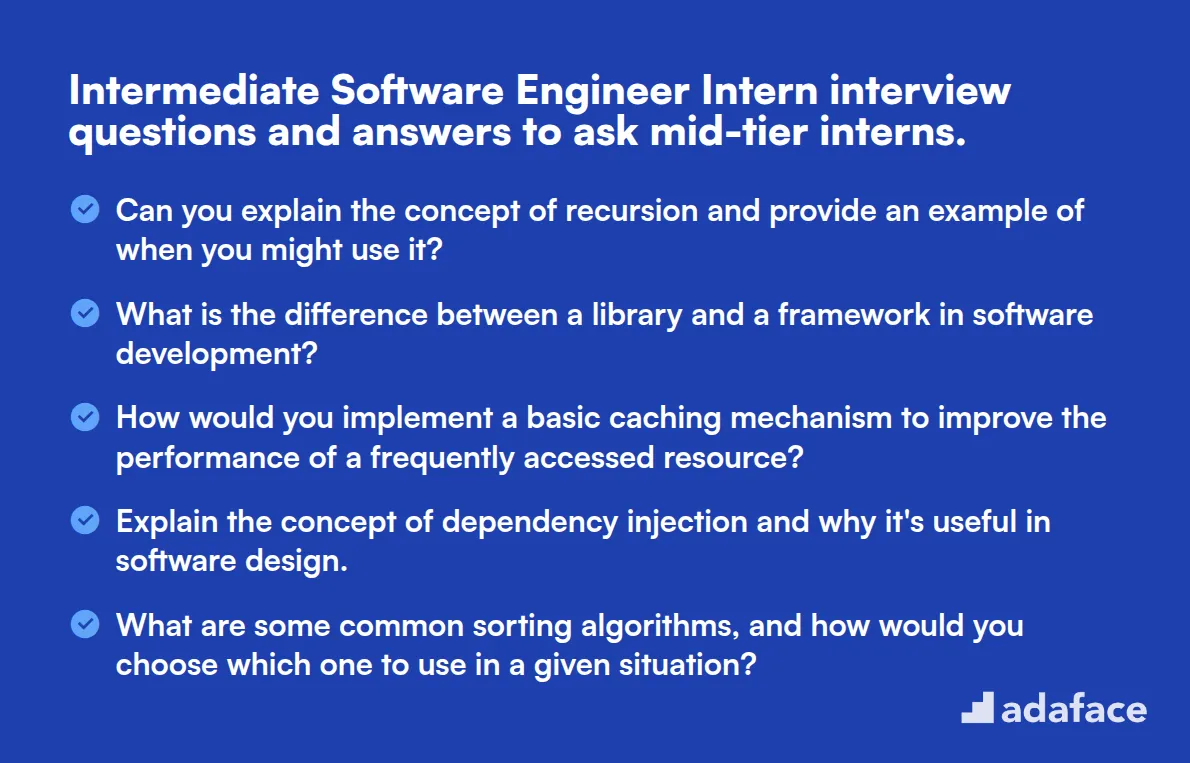
To assess the technical proficiency of mid-tier software engineer interns, use these intermediate-level questions. They help evaluate problem-solving skills, coding knowledge, and understanding of software development concepts. Ask these during technical interviews to gauge candidates' readiness for more complex tasks.
- Can you explain the concept of recursion and provide an example of when you might use it?
- What is the difference between a library and a framework in software development?
- How would you implement a basic caching mechanism to improve the performance of a frequently accessed resource?
- Explain the concept of dependency injection and why it's useful in software design.
- What are some common sorting algorithms, and how would you choose which one to use in a given situation?
- Can you describe the differences between unit testing, integration testing, and end-to-end testing?
- How would you approach debugging a memory leak in a program?
- What is the purpose of a design pattern, and can you give an example of one you've used?
- Explain the concept of asynchronous programming and when you might use it.
- How would you design a simple key-value store database system?
5 advanced Software Engineer Intern interview questions and answers to evaluate senior interns
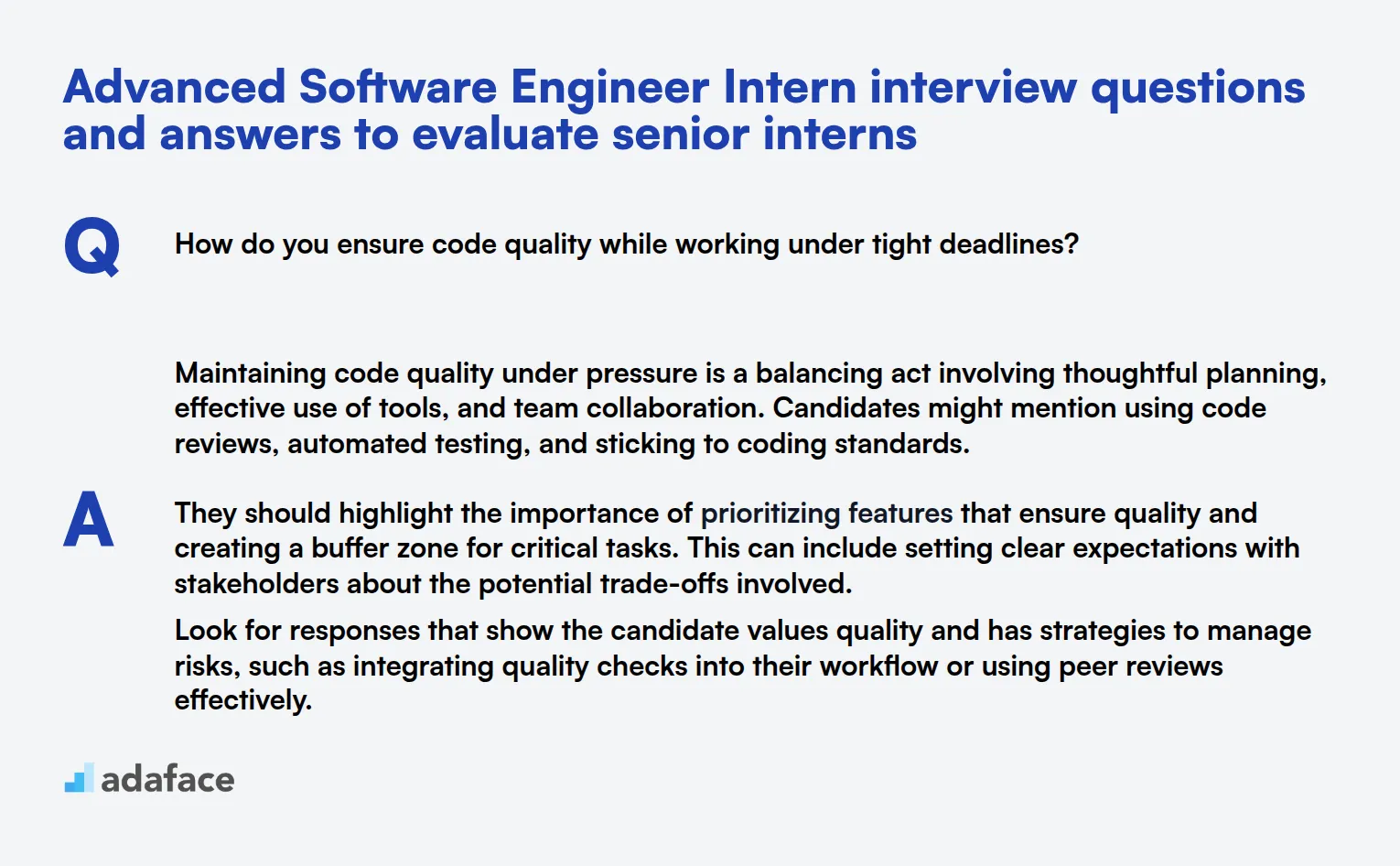
For those aiming to sift through the cream of the crop among senior software engineer interns, these advanced questions are your treasure map. Use them when your candidates are a bit more seasoned and you're looking to challenge their problem-solving skills and depth of understanding.
1. How do you ensure code quality while working under tight deadlines?
Maintaining code quality under pressure is a balancing act involving thoughtful planning, effective use of tools, and team collaboration. Candidates might mention using code reviews, automated testing, and sticking to coding standards.
They should highlight the importance of prioritizing features that ensure quality and creating a buffer zone for critical tasks. This can include setting clear expectations with stakeholders about the potential trade-offs involved.
Look for responses that show the candidate values quality and has strategies to manage risks, such as integrating quality checks into their workflow or using peer reviews effectively.
2. Describe a situation where you had to refactor existing code. What was your approach and why?
When refactoring, the goal is to improve the structure without altering the functionality. Candidates might discuss identifying code smells or inefficiencies and prioritizing them based on impact.
They should explain how they used small, incremental changes to reduce risks and utilized testing to ensure functionality remained intact throughout the process.
A strong answer will demonstrate a clear understanding of the benefits of refactoring, such as improved readability and maintainability, and the candidate's ability to articulate their thought process and decision-making skills.
3. How do you stay updated with the latest technologies and industry trends?
Staying current in the fast-paced tech world requires continuous learning. Candidates might mention subscribing to industry newsletters, following tech blogs, attending webinars, or participating in online forums.
They could also highlight the importance of hands-on practice, such as building side projects or contributing to open-source, to better understand and apply new technologies.
Look for answers that show a proactive approach to learning and curiosity about technology, which are crucial traits for any software developer.
4. What strategies do you use to manage technical debt in your projects?
Managing technical debt involves making informed decisions about when to write quick fixes versus investing time in robust solutions. Candidates might discuss prioritizing debt based on impact and risk, and regularly allocating time for refactoring.
They should also mention tools or methodologies they employ to track and manage debt, such as maintaining a debt log or using agile practices to continuously review and address technical debt.
An ideal response will illustrate a strategic approach to balancing immediate needs with long-term project health, showing an understanding of the implications of technical debt on project timelines and quality.
5. Can you describe a time when you had to quickly learn a new technology or framework? How did you handle it?
When faced with new technologies, candidates might describe breaking down the learning process into manageable steps, such as understanding fundamentals, experimenting with small projects, and seeking help from community resources.
They should emphasize the use of documentation, tutorials, and mentor guidance to accelerate learning and integration into their project work.
A good answer will reflect the candidate's adaptability and eagerness to learn, as well as their strategies for effectively integrating new skills into their work.
8 Software Engineer Intern questions related to coding principles
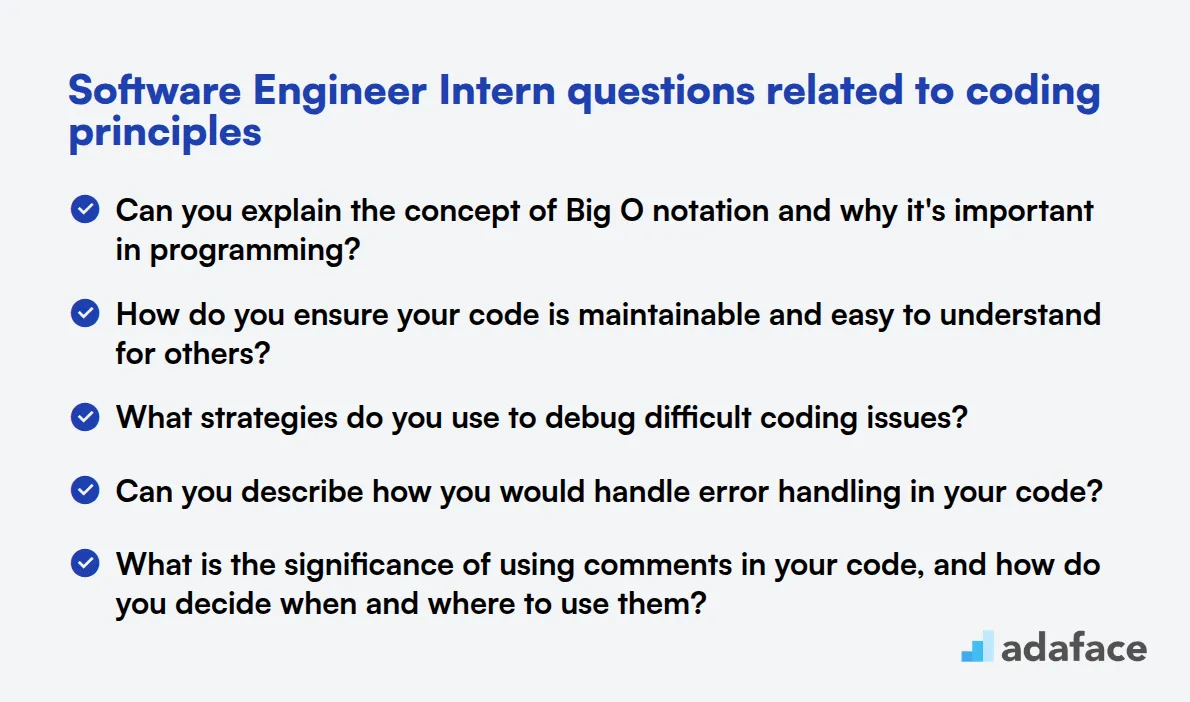
To evaluate whether candidates grasp essential coding principles, consider using these software engineer intern questions during your interviews. This list will help you gauge their understanding of fundamental concepts crucial for a successful software engineer intern role, enabling you to identify promising talent with the right technical foundation.
- Can you explain the concept of Big O notation and why it's important in programming?
- How do you ensure your code is maintainable and easy to understand for others?
- What strategies do you use to debug difficult coding issues?
- Can you describe how you would handle error handling in your code?
- What is the significance of using comments in your code, and how do you decide when and where to use them?
- How do you approach writing test cases for your code?
- Can you explain the concept of DRY (Don't Repeat Yourself) in programming and provide an example?
- How would you approach improving the readability of a complex piece of code?
8 Software Engineer Intern questions related to technical definitions
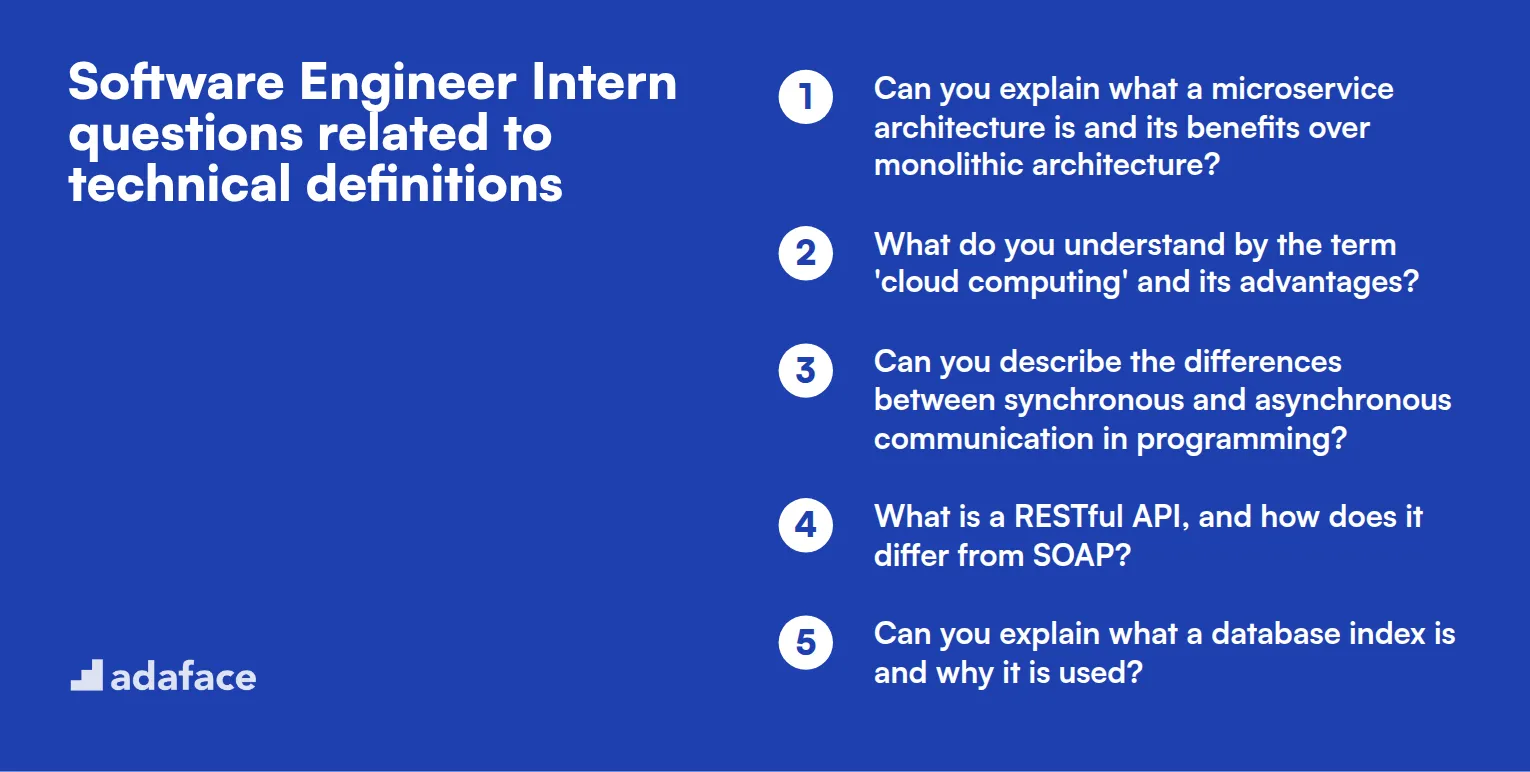
When interviewing software engineer interns, having a clear set of technical definition questions can help you assess their foundational knowledge. Use this list to gauge their understanding of essential concepts that every software developer should know, ensuring they fit well within your team's expectations. For further insights, explore our job descriptions.
- Can you explain what a microservice architecture is and its benefits over monolithic architecture?
- What do you understand by the term 'cloud computing' and its advantages?
- Can you describe the differences between synchronous and asynchronous communication in programming?
- What is a RESTful API, and how does it differ from SOAP?
- Can you explain what a database index is and why it is used?
- What is the purpose of a build tool, and can you provide an example of one?
- How would you define 'agile methodology' in software development?
- What is the role of a compiler in programming, and how does it differ from an interpreter?
6 situational Software Engineer Intern interview questions for hiring top interns
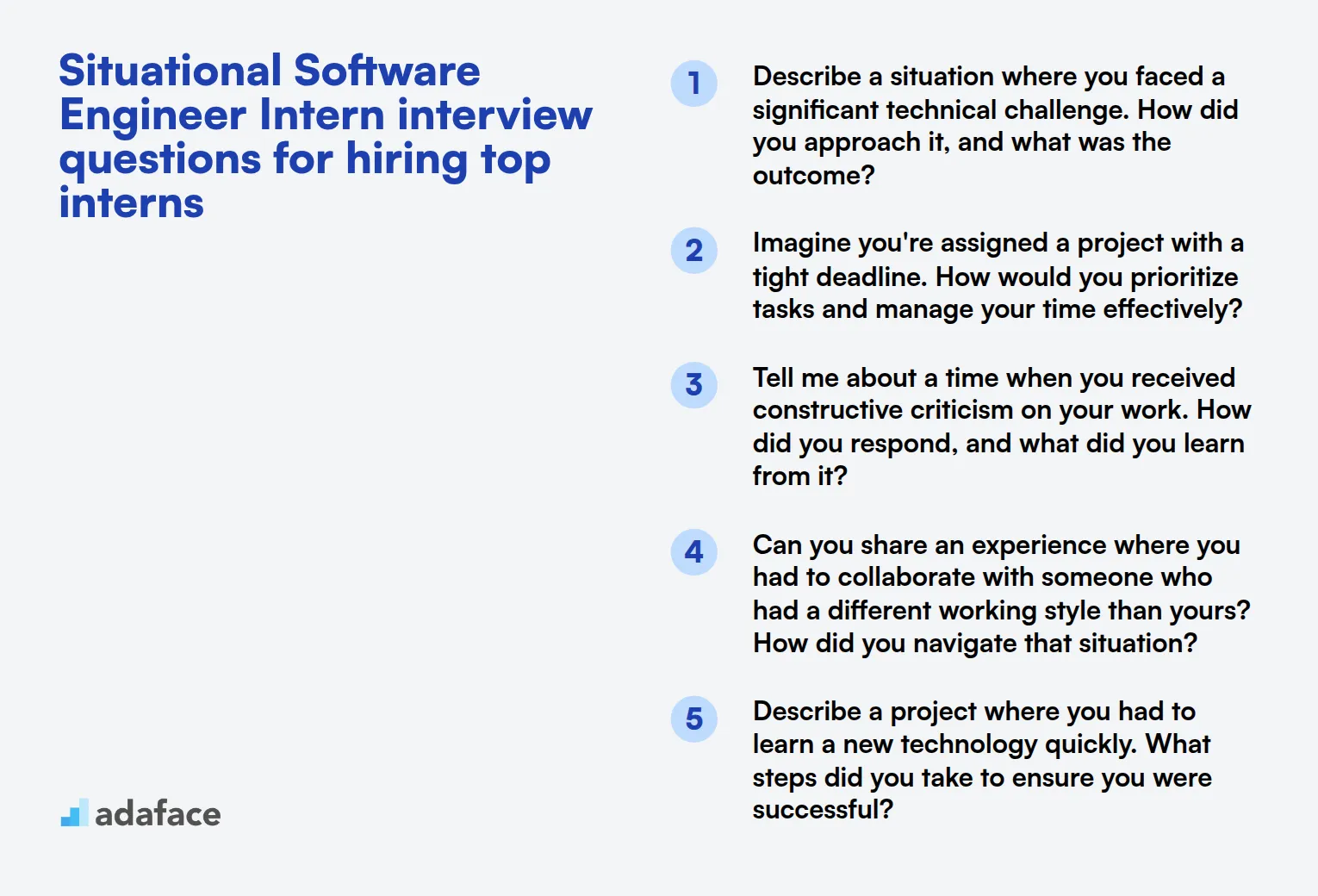
To identify top talent among software engineer interns, it’s crucial to ask situational questions that reveal their problem-solving and teamwork abilities. Utilize these questions during your interview process to gain insight into how candidates handle real-world scenarios in software development. For a comprehensive understanding of the role, consider reviewing the Software Engineer Intern Job Description.
- Describe a situation where you faced a significant technical challenge. How did you approach it, and what was the outcome?
- Imagine you're assigned a project with a tight deadline. How would you prioritize tasks and manage your time effectively?
- Tell me about a time when you received constructive criticism on your work. How did you respond, and what did you learn from it?
- Can you share an experience where you had to collaborate with someone who had a different working style than yours? How did you navigate that situation?
- Describe a project where you had to learn a new technology quickly. What steps did you take to ensure you were successful?
- Have you ever encountered a disagreement in a team setting? How did you handle it, and what was the result?
Which Software Engineer Intern skills should you evaluate during the interview phase?
When interviewing Software Engineer Interns, it's impossible to assess every aspect of a candidate's capabilities in a single session. However, focusing on core skills can provide insight into their potential to grow and contribute effectively. Here are some key skills to evaluate during this phase.
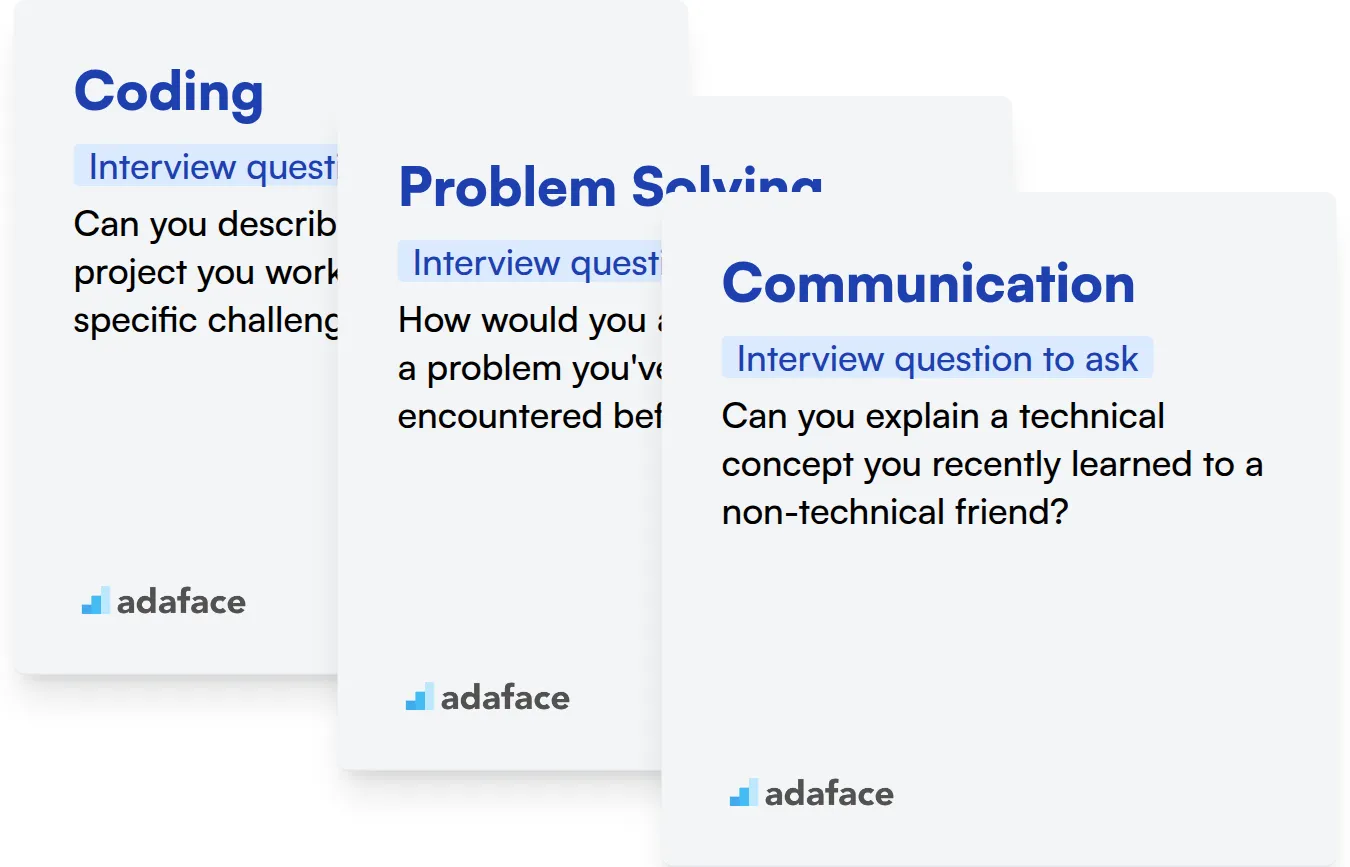
Coding
Using a coding assessment test with tailored MCQs can help filter candidates who have a good grasp of programming concepts and practices. Consider using an assessment like the Software Engineer Coding Test.
Interviewers can also include targeted questions to gauge the intern's coding abilities and problem-solving skills.
Can you describe a coding project you worked on and the specific challenges you faced?
When asking this question, look for candidates who can clearly articulate the problem, the solution they implemented, and the thought processes behind their decisions. This reveals their coding logic and ability to tackle challenges.
Problem Solving
To evaluate problem-solving abilities, pose scenarios that require analytical thinking and innovative solutions.
How would you approach solving a problem you've never encountered before?
Look for structured thinking and a clear approach to gathering information, hypothesizing, testing, and iterating. A good candidate will demonstrate logical reasoning and adaptability.
Communication
Consider using a Communication Skills Test that includes scenarios and questions to assess candidates' communication abilities.
In interviews, ask questions that require candidates to explain technical topics or past experiences.
Can you explain a technical concept you recently learned to a non-technical friend?
When the candidate responds, watch for clarity, simplicity, and the ability to adjust their explanation based on the listener's understanding. This skill indicates their ability to work well in diverse team environments.
Hire the Best Software Engineering Interns with Adaface's Skill Tests
When looking to hire someone with software engineering skills, it's important to ensure candidates possess the necessary expertise. Evaluating their skills accurately can make or break your recruitment process.
The most effective way to assess these skills is by using skill tests. Consider using our Software Engineering Online Test or Coding Entry-Level Algorithms Test to identify the right candidates.
Once you utilize these tests, you'll be able to shortlist the best applicants based on their test performance. This makes your interviews more focused and productive by knowing you're already speaking to qualified candidates.
To find out more about how to get started, visit our Online Assessment Platform or head straight to sign up to begin the process.
Software Engineering Online Test
Download Software Engineer Intern interview questions template in multiple formats
Software Engineer Intern Interview Questions FAQs
Look for programming fundamentals, problem-solving abilities, teamwork skills, and eagerness to learn. Assess their knowledge of relevant programming languages and basic software development concepts.
Ask coding-related questions, give small coding tasks, or use online coding platforms for live coding exercises. Focus on their problem-solving approach and code quality.
For junior interns, focus on basic programming concepts. For mid-tier interns, include more complex algorithms and design questions. For senior interns, ask about system design and advanced programming paradigms.
Situational questions are valuable for assessing an intern's problem-solving skills, teamwork abilities, and how they might handle real-world scenarios in a professional environment.
Yes, technical definition questions help gauge the intern's theoretical knowledge and familiarity with industry terms, which is important for effective communication in a development team.

40 min skill tests.
No trick questions.
Accurate shortlisting.
We make it easy for you to find the best candidates in your pipeline with a 40 min skills test.
Try for freeRelated posts
Free resources




